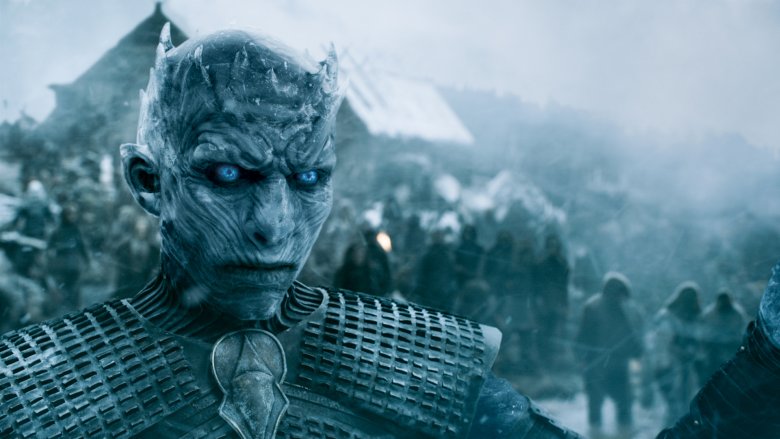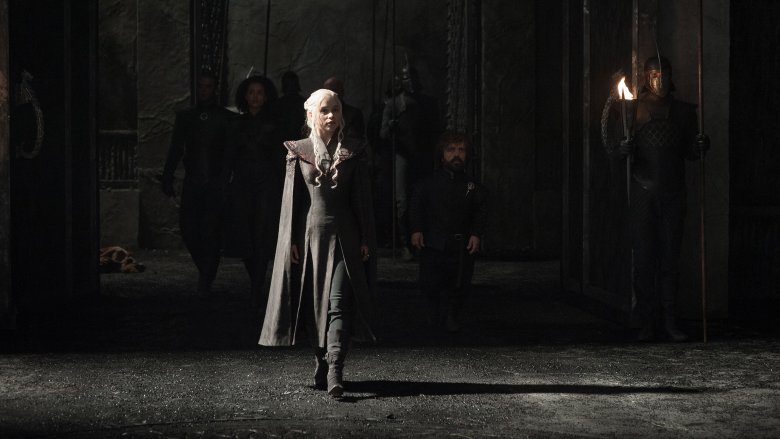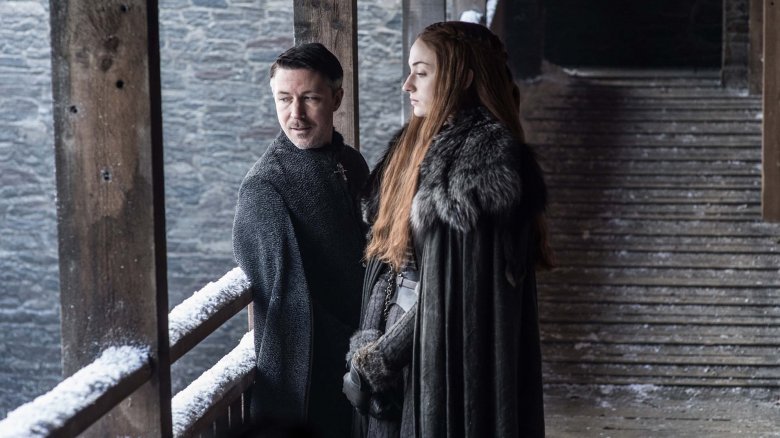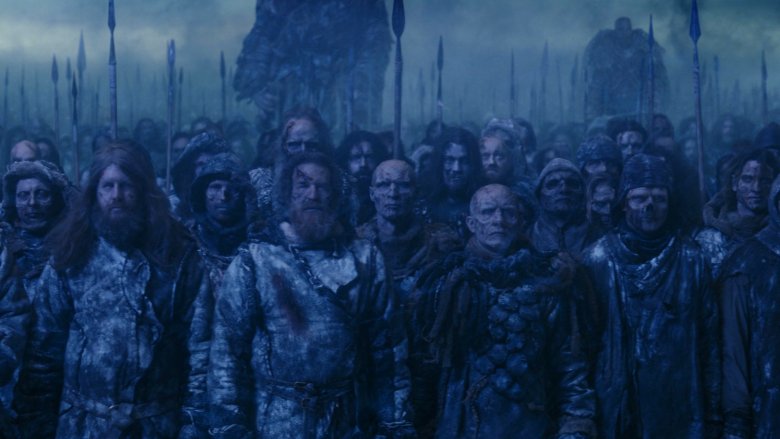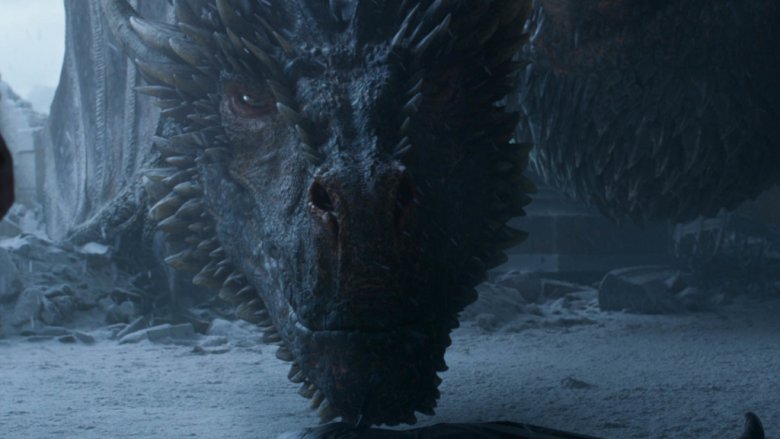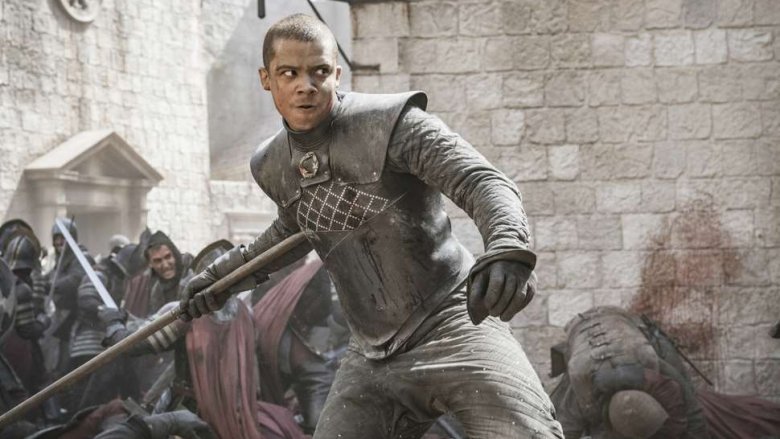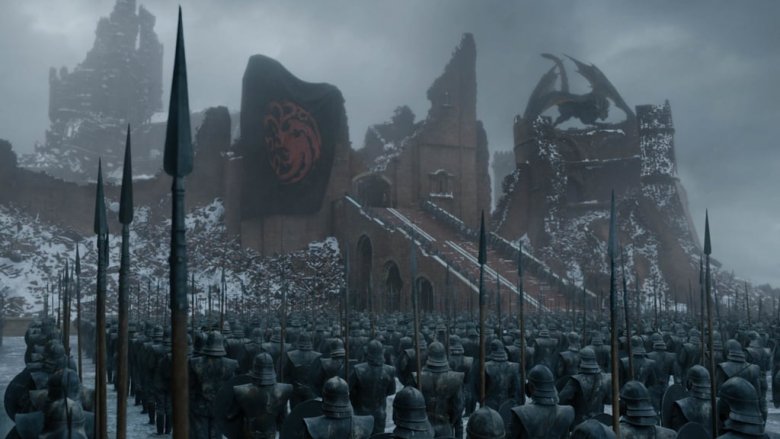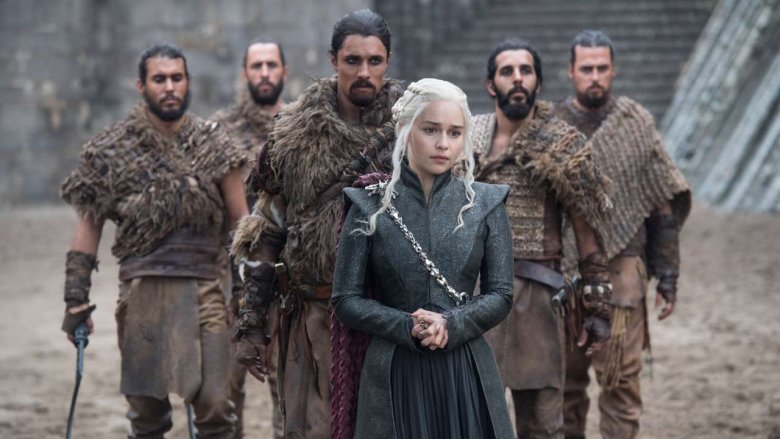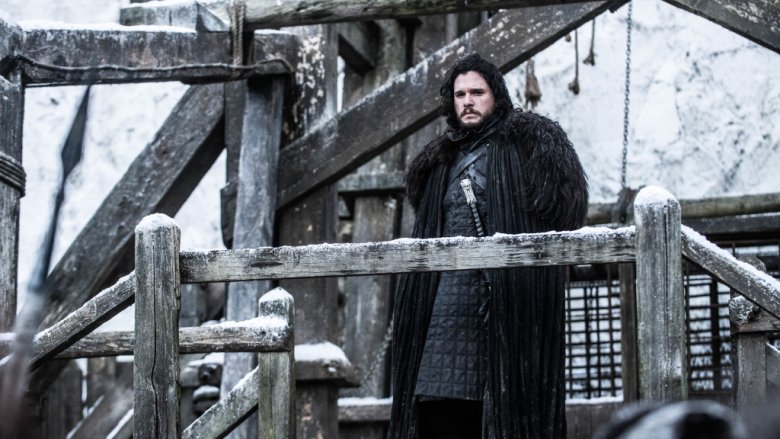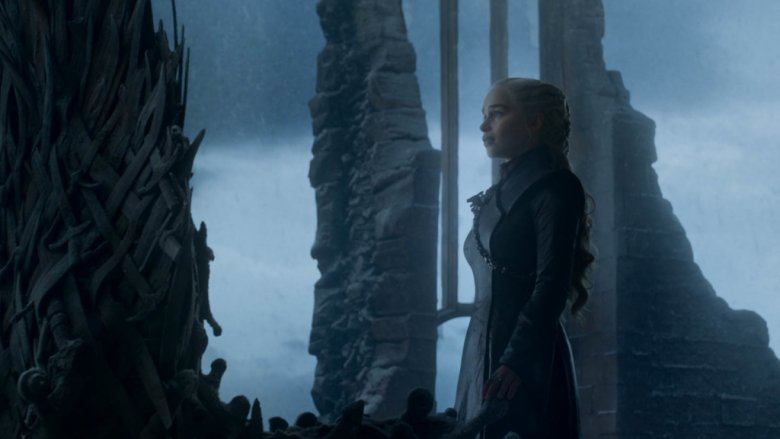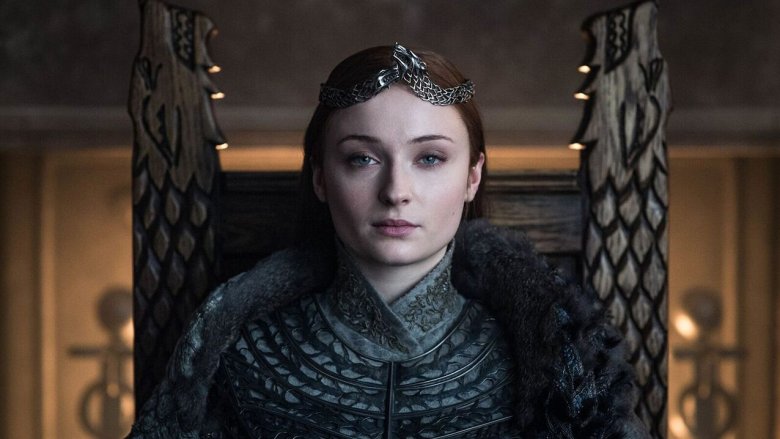Game Of Thrones' Most Confusing Moments Explained
HBO's epic fantasy series Game of Thrones is on the verge of finally wrapping up its narrative with its eighth season. Arguably the biggest show on television in just about every respect, not only is it a huge ratings hit for the network, but it's also just plain huge, spanning dozens of locations, hundreds of characters, and sequences big enough that they look they belong on a movie screen week after week. That means the show is packed with details, and that means some of those details are bound to leave viewers puzzled now and then.
With its seventh season, Thrones thankfully wrapped up quite a few loose ends — and clarified some others — as it heads into its endgame, but fans still have plenty of questions. Some of those questions won't be answered until the credits roll on the series finale, but a few can be explained by context, logic, and the cast and crew themselves. Here's a look at some things about Game of Thrones that may have confused you — and the explanations you've been waiting for.
SPOILERS for Game of Thrones ahead!
The uneven passage of time
When Game of Thrones began, events unfolded on a somewhat smaller scale, and characters tended to cluster together. Sure, Daenerys was across the Narrow Sea and Jon was at the Wall, but much of the action in the first season revolved around the politics of King's Landing. As the story developed, various subplots splintered and characters scattered, and even though things are condensing as the show heads into its final year, the epic scope of the story has meant the series only has time for the big stuff. That's created some confusing moments for fans, as it often seems like events that would normally take days or even weeks (there are no jets in Westeros) unfold in a matter of minutes. You can go through and try to construct an elaborate timeline if you like, but the reality of watching Game of Thrones now means you just have to understand that a lot of boring stuff like travel is happening in between the dragon attacks and tense meetings, and that the various subplots aren't always unfolding at the same time. Here's how director Alan Taylor explained one such discrepancy in Season 7:
"[Fans] seemed to be very concerned about how fast a raven can fly but there's a thing called plausible impossibilities, which is what you try to achieve, rather than impossible plausibilities. So, I think we're straining plausibility a little, but I hope the story's momentum carries over some of that stuff."
Arya and Sansa's sudden team-up
The reunion of Sansa and Arya Stark at Winterfell was one of the most emotional moments of season 7, but it was quickly replaced by tension between the sisters. Arya's assassin training made her cold, distant and even sociopathic in Sansa's eyes, while Sansa's position as "Lady of Winterfell" reinforced in Arya the belief that her sister always felt superior to other people. That, plus Littlefinger's manipulation of them both, created a sense that the two were on a collision course, and for a while it seemed Sansa was about to order Arya's execution...until she ordered Littlefinger's instead.
The sudden turn that led to the Stark siblings teaming up to take down the great manipulator was one of the season's best moments, but for some viewers it crept up a little suddenly. Was all that arguing really just an elaborate ploy to make Littlefinger think he was winning, or did we just miss something? Well, obviously Sansa and Arya did some kind of planning before the execution, but according to Isaac Hempstead-Wright, who plays Bran, it was originally going to be presented as something more concrete. A scene was shot that showed Sansa asking Bran to use his Three-Eyed Raven knowledge to verify Littlefinger's guilt and Arya's innocence, but it didn't make it into the show. Viewers were left to make assumptions instead of having it all spelled out.
The army of the dead vs. The Wall
The fall of the Wall resolved one of the most enduring questions on Game of Thrones, which has been lingering ever since the army of the dead was revealed: How exactly were all those wights going to make it South of the Wall? Jon Snow kept trying to warn everyone that the threat was real, but even if it was, the wall is massive — enough that perhaps a whole bunch of rotting corpses would have trouble climbing it. Fans theorized that perhaps the White Walkers would use the oncoming winter to walk across frozen pieces of ocean and go around the Wall, but in the end they didn't have to, because they got a dragon.
While it was certainly an efficient way to bring the Wall down, using the reanimated Viserion to do it also raised some questions — like why the White Walkers couldn't have used some other destructive means to simply bring the structure down, like catapults or other siege machines. Well, in addition to being labor intensive, it didn't address yet another problem: The Wall is more than just ice. It's protected by centuries-old magic, magic that the White Walkers couldn't get past. The dragon (an innately supernatural creature itself), coupled with the Night King's growing power in winter (and possibly his connection to Bran Stark), was enough to apparently overwhelm that magic. As for why its fire is blue...well, that's another mystery of the Night King's magic.
Drogon's destination
The death of Daenerys Targaryen was going to be a powerful moment on Game of Thrones in any context, but the moment gained even more power with what came immediately after. Sensing the death of his mother, her last dragon Drogon flew up to the throne room and, rather than attempting to burn Jon Snow (who, being a Targaryen, might not have burned anyway) turned his wrath on the Iron Throne itself. We don't know if he somehow thought the throne had killed his mother literally or if he was simply tired of seeing humans bicker over the chair, but either way the moment carries huge weight.
Drogon followed this act of symbolic destruction by picking Dany's body up in his talons and simply flying away without attempting to burn or eat anyone or anything else. The last we hear of him is that he's "flying east toward Volantis," meaning he intends to return to Essos, but beyond that we don't know. So what's the dragon's plan?
Well, it's quite likely he doesn't have a plan. If Drogon is as smart as "The Iron Throne" makes him seem, he's probably done with the petty concerns of humans, and he may see it as his duty as the last of his kind to either look for more dragons or to simply break the cycle of humans using him as a weapon of war. It would be hard to argue with either of those goals.
Grey Worm's Mercy
The last three episodes of Game of Thrones were rough indeed for Grey Worm, commander of the Unsullied and, ultimately, Daenerys' Master of War. He had to watch his lover Missandei get publicly beheaded, then he had to wait to seek revenge, and then he had to find that his queen was killed when he least expected it. Anger can't begin to describe what he was feeling.
Why, then, did Grey Worm let both Tyrion and Jon go instead of simply declaring war on the Seven Kingdoms? There a couple of reasons for this, one of which is that he might not have wanted to risk the lives of any more Unsullied on a now-pointless war in a strange country. The other reason: Grey Worm was trained to serve, and he took great pride in serving his queen with honor and reliability. With his Queen gone, he was unmoored, desperate for justice but unsure of what that looked like. When Tyrion offered him an alternative, he simply wanted to get away from Westeros and leave these people to their bickering.
The future of the Unsullied
As part of the negotiations with Grey Worm, Ser Davos offers the Unsullied land in the Reach that was previously occupied by now-deceased lords (RIP Tyrells and all their supporters), offering the former slaves the chance to settle down, form a noble house, and carve out a new existence for themselves away from a life of constant war. Grey Worm almost immediately turns this offer down, and demands "justice" instead of payment. What he gets is less a punishment for those he feels wronged him and more of a restructuring that he can perhaps live with.
The last time we see the Unsullied, they are boarding ships, but it's not the Reach they're bound for. Gritting his teeth against the sight of Jon Snow walking free, Grey Worm commands his men to sail to the Isle of Naath, the birthplace of Missandei. Earlier in the season, they talked about sailing there together to live on the beaches, and now that she's gone, he plans to visit her homeland in her memory.
The future of the Dothraki
The Unsullied sail for Naath, but as the Jon walks around the docks of King's Landing, we see that they are apparently going alone. The Dothraki, who've been partners in war with the Unsullied for two seasons, have stayed behind, or at least some of them have. So... what will they do?
This creates an interesting problem for the Dothraki, who didn't want to cross the Narrow Sea in the first place out of fear. Unlike the Unsullied, who were slave warriors only now adjusting to the possibility of life outside of battle, the Dothraki already have their own culture and traditions, many of them revolving around them nomadic life as horsemen. Will they become sellswords? Will they simply ride from place to place? Will they pledge themselves to some lord or other, depending on who offers them the best gold? Will they dare to cross the Sea again? The show does not provide us a definitive answer, but even if they're only in Westeros temporarily, they may present a problem for King Bran the Broken.
The scope of Bran's power
It's been clear for some time now that Bran Stark's travels beyond the Wall and his time under the tutelage of the Three-Eyed Raven left him with an immense level of power that's at once baffling and sometimes even terrifying, even to his own family. The show has always been deliberately mysterious about exactly what Bran knows or doesn't know, but his answer upon being offered the Iron Throne opened up a whole new round of questions: "Why do you think I came all this way?"
So, in some form or other, Bran Stark can see the future. His acceptance of the throne as well as things like gifting the dagger to Arya make that clear. If that's true, why hasn't he said anything? Why didn't he try to save more lives and more time by simply telling his sisters, at least, who needed to be where and when? The most likely answer can be found not in Game of Thrones, but in Doctor Strange's words in Avengers: Endgame: "If I tell you what happens, it won't happen." Bran risks changing the outcome by spilling too many details, and so he has to influence rather than inform.
Jon's last ranging
In the end, part of the compromise the Lord and Ladies of Westeros strike with Grey Worm includes Jon Snow's exile — again — to the Night's Watch, where he will again take the oaths of celibacy and loyalty that he'd long ago given up. It's not clear what exactly the Night's Watch are supposed to be watching for now that the White Walkers are gone (an attack by Wildlings is still possible in some form), and the Wall has a big hole in it, but as soon as Jon arrives at Castle Black he changes those plans anyway.
At Castle Black, Jon reunites with Tormund Giantsbane and his direwolf, Ghost, and together with a group of surviving Wildlings they venture out Beyond the Wall together, into a True North that is now free of the army of the dead. Jon doesn't make his plans known, but the way Tormund seems to defer to him suggests very strongly that Jon is venturing out into Wildling lands to take his new place as King Beyond the Wall, living and ruling among the Free Folk far away from the machinations of King's Landing.
Unfulfilled prophecy
Game of Thrones was a show that often thrived on prophecies, whether they were nonspecific visions of dragons flying over King's Landing or very specific foretellings pertaining to characters like Cersei Lannister. We went into the series finale with a great many of these prophecies still unfulfilled, and if you read any of the major prophecies literally, we came out of the finale the same way.
What happened to Azor Ahai, the resurrected hero that was supposed to end the great darkness with his sword, Lightbringer? Well, that could have been Jon metaphorically ending the darkness by stabbing Dany (in the prophecy, Azor Ahai forges lightbringer by stabbing his lover). And what about the prophecy that Cersei's little brother would kill her? Well, Cersei was crushed by the Red Keep, but in some way wasn't it Tryion's fault she was down there in the first place?
Game of Thrones' many prophecies may have just meant nothing in the end, but if you want to have faith in such things, there are enough metaphorical possible readings that you can make most of them work... sort of.
Six Kingdoms
At the summit in the dragon pit at King's Landing, the Lords and Ladies of Westeros do more than just choose a new king in Bran. They also create the Six Kingdoms of Westeros. As the lords and ladies all vote for Bran, Sansa Stark declares that, while she's sure her brother will be a good king, she wants the North to remain independent. Bran acquiesces without argument, and the Queen in the North is born.
The confusion comes when one starts to wonder why other regions didn't also try the same thing, particularly Dorne (which has always exercised a sort of semi-autonomy) and the Iron Islands (who tried to rebel even before the War of Five Kings). It might simply be that they don't feel they have the resources or manpower to exist separate from the central state of Westeros, and so they'd be putting their people in danger if they splintered off. It might also be that even Yara Greyjoy, with her father's taste for warlike leadership, has had enough war, and fears another might one day come if she declares herself a Queen. It could also simply be that, after so much fighting, everyone but Sansa is too tired to assert themselves.
